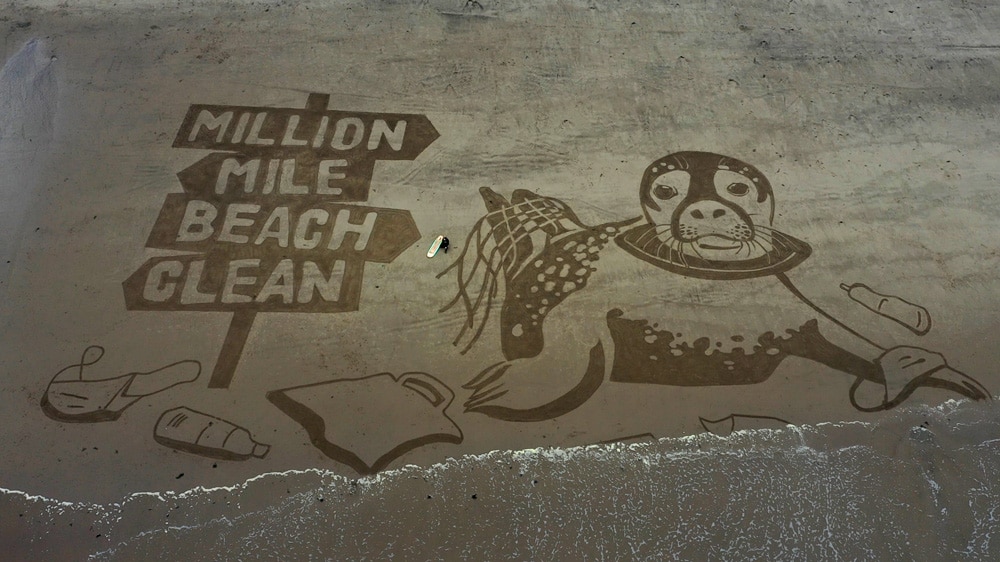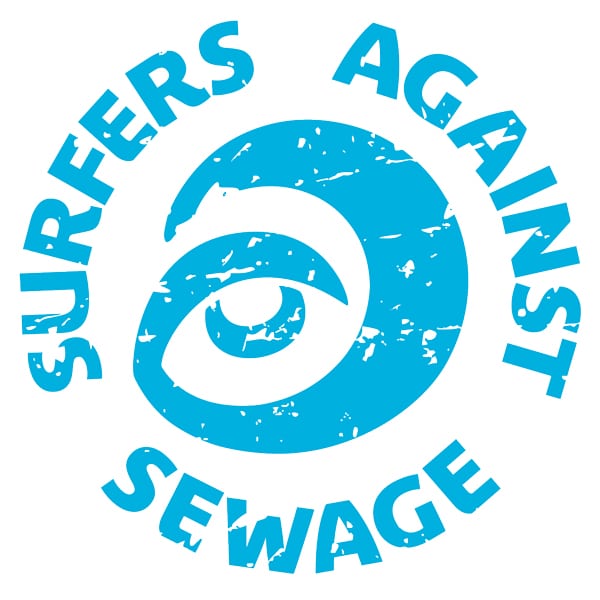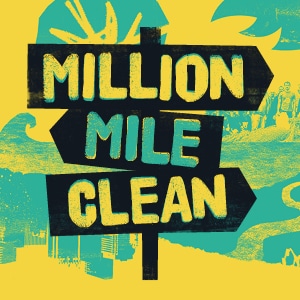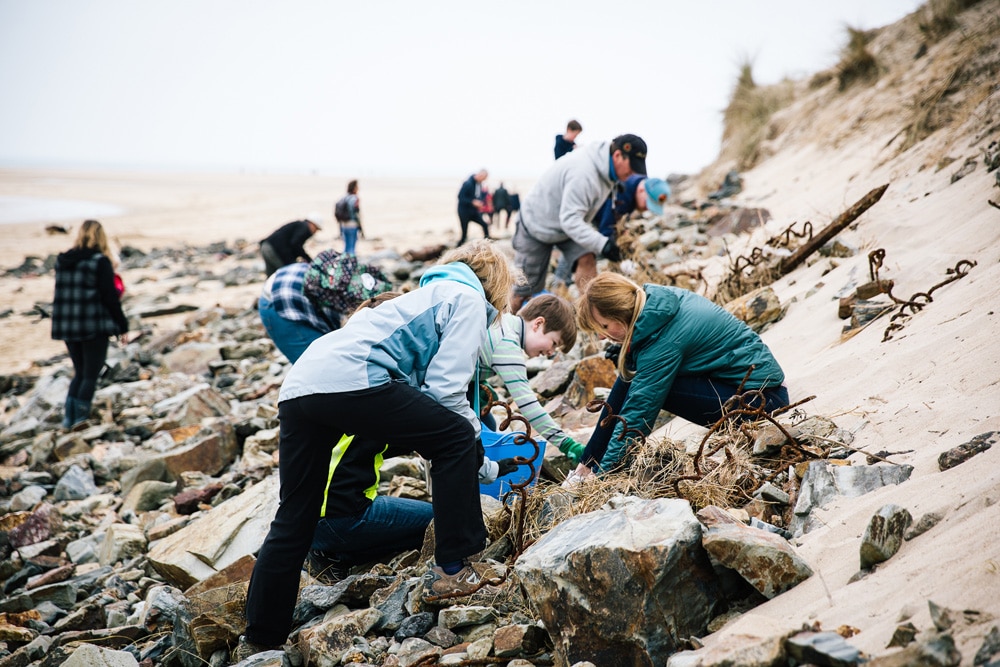Marine Life & Conservation
Surfers Against Sewage launch ‘Million Mile Beach Clean’ – the UK’s biggest ever beach clean

 UK charity Surfers Against Sewage marked the launch of their ‘Million Mile Beach Clean’ with a 50-metre sand drawing of a seal surrounded by plastic on Cayton Bay in Yorkshire.
UK charity Surfers Against Sewage marked the launch of their ‘Million Mile Beach Clean’ with a 50-metre sand drawing of a seal surrounded by plastic on Cayton Bay in Yorkshire.
The striking image highlights the impacts of plastic pollution on marine wildlife, which the charity aims to tackle this year by inspiring 100,000 people to clean up their local beach, river, street or green space. The result will be one million miles cleared by the end of the year, protecting oceans, beaches and wildlife – and giving Brits a much-needed boost as we emerge from lockdown.
‘The Million Mile Beach Clean’ is part of a new environmental initiative, the Million Mile Clean, encouraging people to get out locally, on streets, country lanes, in parks and along local waterways to tackle plastic pollution and litter. The campaign aims to reconnect people with their local environment to help their physical and mental well-being. The lead partner for the campaign over the next three years is the Iceland Foods Charitable Foundation (IFCF), building on its previous support for nationwide beach cleans.
 Whilst the initiative will run throughout 2021, the first week of action will take place between the 15th and 23rd of May. Surfers Against Sewage are calling for Clean Leaders across the UK to join the biggest beach clean ever and register to lead a clean during this period.
Whilst the initiative will run throughout 2021, the first week of action will take place between the 15th and 23rd of May. Surfers Against Sewage are calling for Clean Leaders across the UK to join the biggest beach clean ever and register to lead a clean during this period.
According to new research commissioned by Surfers Against Sewage, over half of Brits (54%) think COVID-19 has led to an increase in plastic pollution, with almost two-thirds (59%) seeing more waste in their area over the last 12 months. This increase could be down to the fact that a fifth (18%) of the population has bought more single-use plastic items as a result of the pandemic, with the same proportion opting to use disposable facemasks, rather than reusable ones.
The majority of people (74%) spot over 10 pieces of plastic or litter on an average walk. When extrapolated against the UK population, this could account for nearly 500 million pieces of litter and plastic pollution. Worryingly, 51% even say they see more plastic on UK beaches than wildlife, and 41% believe that UK beaches are more polluted than our European counterparts.
Hugo Tagholm, Chief Executive of Surfers Against Sewage, commented: “The ocean is under threat and we are running out of time to save it. We want to inspire an army of ocean activists to join the cause and put an end to plastic pollution in the UK. After more than a year of isolation, social distancing and reduced physical activity, the Million Mile Beach Clean reconnects communities with the environment and provides numerous benefits to mental health and physical well-being. Sign up and get involved today and together we can make a difference.”
‘The Million Mile Beach Clean’, created in direct response to the pandemic, will reconnect people with the ocean and their natural surroundings, whilst also restoring well-being as the UK emerges from winter and the pandemic. This will come as a relief to the 41% of Brits that feel their mental health has deteriorated as a result of lockdown, with half (52%) of the UK population claiming that being near water improves their well-being and mental health.
Dr Sabine Pahl, social psychologist at the University of Plymouth, stated: “Our oceans are an integral part of our planet and our lives. Research shows that the coast and oceans have a positive impact on our health and well-being. Now more than ever it is crucial for people to reconnect with the outdoors and the Million Mile Beach Clean provides an opportunity for people to do something for their health whilst also creating a positive impact on the environment.”
Several notable organisations and individuals are supporting the campaign including the Outdoor Swimming Society, ex-professional surfer and mental health advocate Laura Crane, diver and biologist Gillian Burke and wildlife presenter Lizzie Daly.
Richard Walker, IFCF Trustee and Managing Director of Iceland Foods, added: “As a surfer, beach user and business leader, I believe it is imperative that we protect and restore our oceans as they are essential for all life on earth. The Million Mile Beach Clean is an opportunity to make a positive impact in reducing the impact of plastic pollution across the UK. I can’t wait to be a part of the biggest community clean up ever.”
Surfers Against Sewage are calling for people across the UK to join the campaign and commit to cleaning up their local beach or neighbourhood. To get involved visit their website here and track your beach cleans via their Strava Club community group. The initiative will last throughout the UN Decade of Ocean Science, delivering a million miles a year, ten million by 2030 and aligning with SAS’s ten-year ambition of ending plastic pollution on UK beaches by 2030.
Gillian Burke, wildlife presenter and biologist, said: “Making the connection between mental health and environment is key in mobilising communities in the right way and the Million Mile Beach Clean does just that. 100,000 volunteers, each cleaning their local beach or river or street or mountain – the impact speaks for itself. It’s ambitious, it’s physical, I’m in!”
For more information about Surfers Against Sewage visit their website by clicking here.
Marine Life & Conservation
Paul Watson Released as Denmark Blocks Japan’s Extradition Bid

Renowned anti-whaling activist Paul Watson has been released from custody in Greenland after spending five months in detention. Denmark’s Justice Ministry rejected Japan’s request for his extradition, citing insufficient guarantees that his time already served in custody would be credited against any potential sentence.
The 74-year-old Canadian-American was arrested on July 21 in Nuuk, Greenland’s capital, when his ship docked to refuel. His arrest was based on a 2012 Japanese warrant related to a 2010 encounter in Antarctic waters. Japan alleged Watson obstructed operations and caused damage to a whaling research ship during efforts to disrupt illegal whaling. Watson has consistently denied these claims, maintaining his commitment to marine conservation.
Denmark, which oversees extradition matters for Greenland, concluded that while the legal conditions for extradition were met, the lack of assurances from Japan regarding time-served credit made extradition untenable.
In a video shared by his foundation, Watson expressed gratitude and relief, saying, “After five months, it’s good to be out… and good to know they’re not sending me to Japan.” He added that the most difficult part of his time in custody was being separated from his two young sons.
Watson is a pioneering figure in marine conservation, known for founding the Captain Paul Watson Foundation in 2022 after decades of activism with the Sea Shepherd Conservation Society. His bold efforts to defend marine life have earned him widespread support, including from celebrities and conservationists. His work has also been featured in the acclaimed reality TV series Whale Wars.
Watson’s lawyer, Jonas Christoffersen, praised the decision, stating, “We are happy and relieved that Paul Watson is now free.” He added that Watson is eager to reunite with his family and continue his vital work.
The arrest occurred while Watson’s vessel, the M/Y John Paul DeJoria, was en route to the North Pacific with a team of 26 volunteers to intercept a Japanese whaling ship. His foundation described the arrest as politically motivated and emphasized that Watson’s actions were focused on ending illegal whaling practices.
Japan resumed commercial whaling in 2019 after leaving the International Whaling Commission, asserting that whale meat is a cultural tradition. Conservationists, however, continue to challenge these practices, highlighting their impact on marine ecosystems.
Despite the challenges, Watson remains steadfast in his mission to protect marine life and bring attention to whaling practices. His dedication to ocean conservation has made him a globally respected advocate for the environment.
Marine Life & Conservation
12 Days of Zero-Waste Fish-mas

This holiday period, the Marine Conservation Society, the UK’s leading ocean membership charity, invites you to make some simple changes to eating fish this Christmas to help our seas.
Dr Kenneth Bodles, Head of Fisheries and Aquaculture at the Marine Conservation Society, said, “During the festive season, our consumption increases, but so does waste. Sustainability isn’t just about where food comes from – it’s also about how you use it. By reducing waste and making the most out of your seafood, you’re not only taking steps to be more ocean-friendly, but can also help to cut costs during what is often one of the most expensive times of the year”.
The Marine Conservation Society has compiled twelve tips on how to consume seafood sustainably with zero-waste this Christmas:
Buy whole fish instead of fillets
Instead of fillets, consider buying whole fish such as salmon, hake, or lemon sole. By adopting a “nose to tail” approach with cooking, whole-baked fish not only feeds a crowd, but also helps to minimise waste and maximise sustainability by using up every part of the animal, including bones, skin, and fat.
Make fish stock
Leftover fish bones or shells can be put to good use by boiling them to make a nourishing fish stock or bisque. This can be frozen and preserved for later use and makes for a flavourful base in a soup.
Make your own fish pâté
Avoid waste by turning leftover fish, such as smoked mackerel or salmon, into a delicious pâté by blending with cream cheese and lemon. Perfect when paired with crackers.
The sustainability of salmon and mackerel varies depending on where and how it is caught or farmed. For more information on green-rated options, check the charity’s Good Fish Guide.
Buy frozen
By purchasing seafood that is frozen or vacuum-packed, this helps to reduce waste by extending the shelf life of your food.
Fish pie
If you’re wondering what to do with leftover cooked fish, why not opt for a classic fish pie with mashed potatoes, leeks, and a cheesy sauce? A sure crowd pleaser on Boxing Day.
Use the head
Don’t forget the fish head! The meat is incredibly tender and flavourful. The charity recommends a cod’s head curry or recreating Fallow’s renowned cod’s head in siracha butter.
By stretching your ingredients further, not only is this a more sustainable way to enjoy seafood, but also cost-effective by repurposing leftovers and cooking creatively.
Boxing Day brunch
Mix leftover kippers or smoked salmon with scrambled eggs for a tasty, zero-waste, Boxing Day brunch.
For best choice, make sure you buy kippers, or herring, from the North Sea and the North Irish Sea.
Zero-waste storage
A top tip from the Marine Conservation Society to avoid waste is freezing fish offcuts to save for future use.
Crisp up the skin
Even leftover fish skin can be turned into a quick savoury snack by crisping it up in an air fryer with a little olive oil and salt.
Anchovies two ways
Leftover anchovies can either be blended with butter to make a delicious anchovy butter or tossed into pasta for a hit of umami flavour.
The charity recommends opting for anchovies caught in the Bay of Biscay for best choice.
Fishcakes
For an easy, zero-waste meal, leftover seafood trimmings can be mixed with mash and fried in breadcrumbs to make fishcakes.
Pickled mussels
Try pickling mussels in 1:1 vinegar and water, with a dash of sugar for a sustainable, zero-waste snack that can be enjoyed well beyond the festive season.
Mussels farmed in the UK are a seafood superhero. Grown using low-impact methods and harvested by hand, they get all the food they need from the sea around them. This makes them one of the most sustainable, ocean-friendly, and cost-effective seafood options.
Players of People’s Postcode Lottery have raised £6.6M towards the Marine Conservation Society’s vital work in making seafood more sustainable.
Laura Chow, Head of Charities at People’s Postcode Lottery, said: “Fish is a festive favourite for many, but making sustainable choices when it comes to how we buy and eat seafood makes all the difference for our ocean. Support from players of People’s Postcode Lottery has helped the Marine Conservation Society further its sustainable seafood work, so that we can all enjoy healthier, better protected seas.”
The Marine Conservation Society encourages you to make sustainable seafood choices a year-round habit, not just for Christmas. To check how sustainable the seafood on your plate is, you can visit the charity’s Good Fish Guide. The Guide helps consumers and businesses identify the most sustainable seafood using a simple traffic light system, based on where and how species are caught or farmed. Green is the best choice, amber means improvements are needed, and red indicates fish to avoid buying.
Zero-waste gift idea
Why not embrace a zero-waste Christmas by gifting a membership to support marine conservation? It’s a meaningful, low-waste gift that helps protect our ocean for generations to come. Memberships start from as little as £5 a month – the price of a sandwich and drink from your local coffee shop.
Find the latest sustainable seafood advice for wild-caught and farmed seafood on the Good Fish Guide, downloadable to your phone from www.mcsuk.org/goodfishguide.
-

 News2 months ago
News2 months agoIconic SS United States to become the World’s Largest Artificial Reef
-

 News3 months ago
News3 months agoBook Review – 52 Assignments: Underwater Photography
-

 Gear News3 months ago
Gear News3 months agoDYNAMICNORD – New German diving brand enters the British market
-

 News3 months ago
News3 months agoExploring Cenote El Pit: A Diver’s Dream
-

 Gear News3 months ago
Gear News3 months agoTry BARE drysuits (and maybe even win one!) this Friday with Sea & Sea at North West Dive Fest
-

 Marine Life & Conservation3 months ago
Marine Life & Conservation3 months agoBook Review: Coral Triangle Cameos
-

 Blogs2 months ago
Blogs2 months agoDive the Egyptian Red Sea this Autumn with Regaldive
-

 News3 months ago
News3 months ago2024 Ocean Art Underwater Photo Competition Announced
















